It is said that everyone who feasted with her first wrote a will. She was supposed to let both her father and her brothers into bed. It was immortalized in the pages of their novels Hugo and Dumas, Dionizetti dedicated an opera to it, and Byron was so fascinated by it that he stole a lock of her blonde hair. Who are we talking about? Of course, about Lucrezia Borgia!
Papal Master of Ceremonies Burchard and other chroniclers have described Lucretia as the Messalina of her century, alluding to the Roman empress famous for her intrigue and licentiousness. Guicciardini, for example, attributed to the papal daughter sexual relations not only with his own father, Alexander VI, but also with his brothers Caesar and Juan.
Why did contemporaries insist on portraying this pearl among women as a poisonous menada and bacchant prone to get stained by every disgusting act?
A flower among toads
Lucretia was born on April 18, 1480, when her father, Cardinal Rodrigo Borgia, was 49, and her mother was 39. She lived in a difficult era in which the papacy was far from sacred and corruption was rampant at every turn. / P>
The young Lucrezia received a thorough education. She spoke Spanish with her father and brothers, but also spoke fluent Italian and French, knew Latin and a little Greek. She wrote poetry in several languages, learned music and drawing, embroidered beautifully and danced wonderfully .
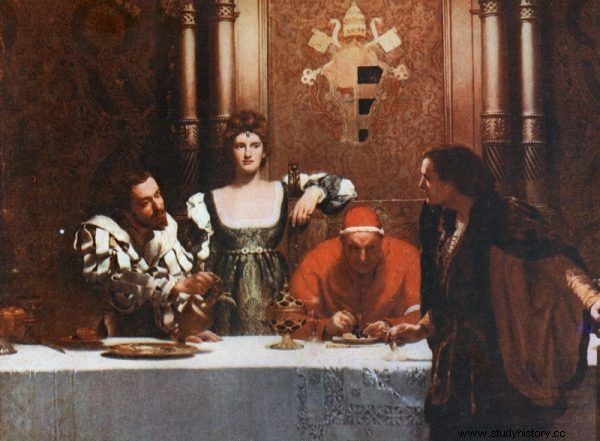
Lucretia with his father-pope and brother. Is she standing between her lovers or the people who used her for their political purposes? "A cup of wine with Caesar Borgia" by John Collier.
Several hundred of her letters have survived, from which the image of a sensitive, modest woman, full of respect for others emerges. Perhaps she owed her bad opinion to the environment she grew up from? In "The Pope's Daughter", Dario Fo puts the words in the mouth of one of the heroes: you were born among loathsome toads who are ready to kill anyone who stands in their way.
The young Lucrezia was soon to find out that there are no jokes with her father and brother, and for them she is primarily a tool of political struggle where all holds are allowed.
A hair of widowhood
Lucrezia was married for the first time at the age of less than 13, a year after her father was elected pope. When her spouse - Giovanni Sforza - fell out of favor and it was decided to send him to the other world, she saved his life.
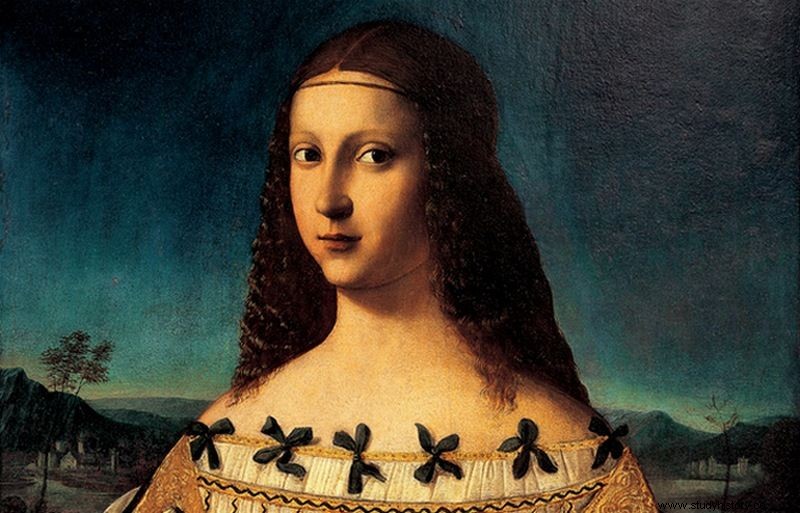
Blessed Beatrice d'Este by Bartolomeo Veneto. This is one of the many 16th-century paintings of saints and blesseds that are recognized as inspired by the beauty of Lucrezia. Or maybe also her noble behavior? (source:public domain)
One evening, during Caesar's visit, her husband's chamberlain Jacomino hid behind the curtain at the behest of his mistress. Her brother told her the order had been given to kill Giovanni. Jacomino warned Sforza, and he fled. As a result, the Pope forced his son-in-law to annul the marriage, which was never to be consummated due to the impotence of Lucrezia's husband.
Giovanni took revenge for his humiliation by spreading nasty rumors about the Borgias. He was so effective that the chronicler Francesco Matarazzo found Lucretia's claim of virginity preposterous, He wrote that the whole country was bursting with laughter for it was known to all and sundry that she was and still remains the greatest harlot to ever live in Rome .
Fratricide by ... sister-in-law?
The marriage scandal cooled family relations, but the tragedy was worse. Juan Borgia was murdered - and it was because of his brother jealous of the position of heir to the family . Some contemporaries ascribed to Caesar a completely different motive, i.e. jealousy for the favors of his sister. However, if Caesar could have been jealous of someone, it would have been ... of their joint sister-in-law, Sancha.
The only witness to the murder was a certain Schiavoni, a timber merchant who saw a corpse being thrown into the Tiber at night. When asked why he didn't report it to the authorities, he stated that had seen more than a hundred dead bodies in the river and no one was interested in them .
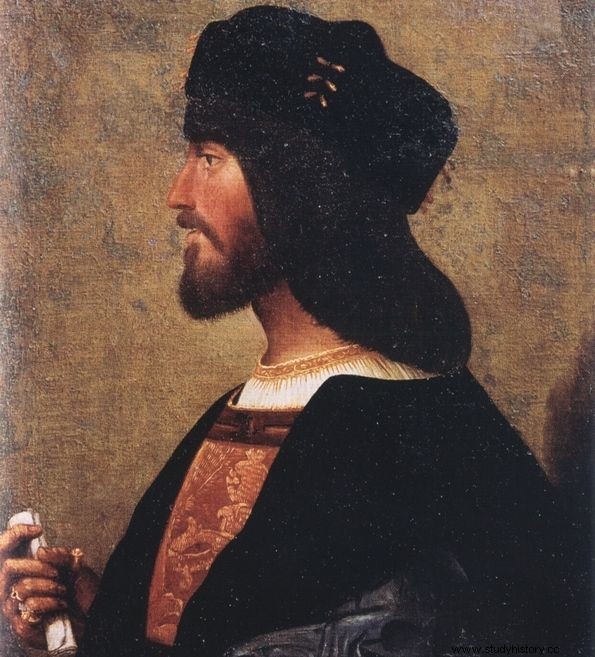
Was it a fratricide? Cezar Borgia (source:public domain).
Juan was fished out with his throat slashed and a satchel with 30 ducats on his belt. The Pope plunged into mourning, and the poets mocked him as "the successor of St. Peter, who is indeed a fisher of men. " And although everyone guessed that Caesar had killed his brother, the case was cranked up.
Second husband? Hell with him!
Lucrezia's second husband was Alfonso d'Aragon, Duke of Bisceglia, whom Caesar genuinely hated. One night as Alfonso was on his way to the Vatican and to his wife, was attacked on the steps of St. Peter by thugs. They wounded him with daggers and left him for death . Somehow the prince managed to crawl all the way to the papal apartments, where Lucrezia found him.
The heavily wounded man was looked after by the Pope, and as many as sixteen guards watched in front of the door to the chamber. His meals were prepared by his sister and wife, fearing the poison. Caesar quickly lost his patience and paid a visit to his recovering brother-in-law. Under any pretext, he threw the women out of the chamber, and his confidant - Miguel de Corella called Michelotto - strangled Alfonso without further ado . Was he punished? Let us give the floor to Dario Fo, who writes in "Daughter of the Pope":
Father first feigns indignation, then turns a blind eye and announces peace. The killer son swears that he did not commit any crime, that he only had to defend himself, because the victim allowed himself to threaten him, and even wanted to impose him on an arrow with a bow. But what is most shocking, after such a brutal crime that would arouse outrage among the subjects of any other country, in Rome in the humanist era, the atmosphere after this murder is filled with a sticky goo that deprives everything of weight and shape. Forgetfulness.
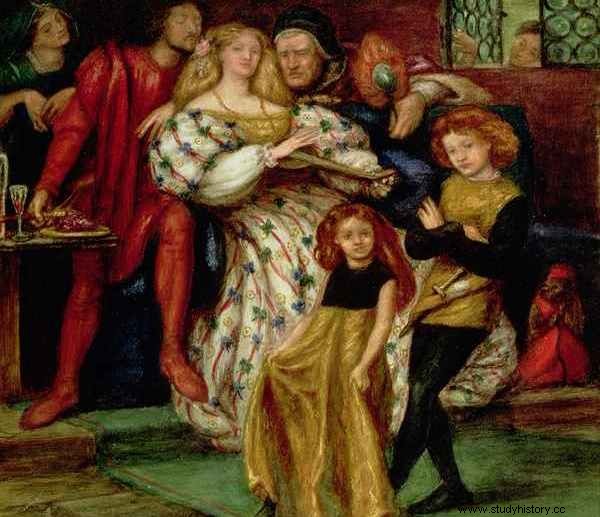
This is how the 19th-century artist Dante Gabriel Rossetti imagined the joy at the papal court of murdering Lucretia's second husband. Contrary to this image, the papal daughter did not enjoy the death of Alfonso (source:public domain).
Third husband? Finally hit!
In late 1501, an exiled Roman baron wrote in a letter attacking the Borgias:
You are wrong, dear friend, if you think you will deal with this monster. […] There is a crime that would not be openly practiced in the Papal Palace . The perfidy of the Scythians and Carthaginians, the bestiality and barbarity of Nero and Caligula, are nothing against them.
With such an opinion trailing behind the family, even the pope found it difficult to match up a daughter. Alexander VI, however, was not discouraged. The third husband of Lucretia was to be the Duke of Ferrara, but the proposal was not warmly welcomed by the old d'Este family, who had the worst possible opinion of the Borgias.
However, the princes of Ferrara themselves were far from perfect, and the pope's future son-in-law reportedly had two passions:casting cannons and walking around the city at night with a sword in one hand and a member in the other. His late wife also became the subject of a scandal. Neglected by her husband, she invited a young black woman to her bed. After long negotiations, 21-year-old Lucrezia found herself on the marital carpet again.
Surprisingly, the marriage with the future Prince of Ferrara was successful. With her beauty, warmth and personality, Lucrezia captivated everyone, and her piety won her the most reluctant. On Holy Thursday, in the first year of her marriage, she publicly washed the feet of 160 poor people. When Ferrara was struck by a famine, the Duchess pawned her valuables to help the poorest.
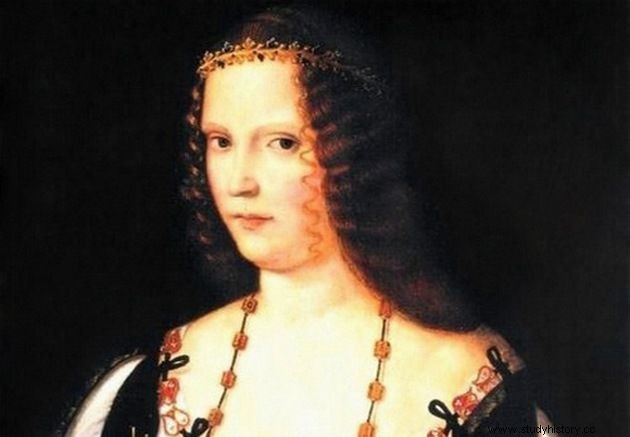
Lucrezia at the age of about 30 - a stately and respected wife, mother and duchess (fragment of a painting by Bartolomeo Veneto, source:public domain).
In later years, Lucrezia corresponded with Pope Leo X, who melted in admiration for her qualities of character. It is hard to avoid the impression that Rodrigo Borgia's daughter, once exiled from worship and faith, became at the end of her life one of the most respected women of her time and nothing could overshadow her reputation. Kat or the victim?
Lucretia went down in history as a poisoner and murderer, but this label should rather be attached to her brother - Caesar. The dignity of a cardinal, and later a condottiere and prince of Romagna, did not prevent him from pursuing his goals over the corpses. Apparently, when he was unable to obtain the hand of Carlotta of Aragonese, he vented his rage on the papal legate, to whom he gave him a dose of poison, which he always had on hand for those who offended him . The unlucky legate died a few days later in torment.
It was said that all of Rome lived in fear of Caesar's poison and his ruthless thugs, ready to eliminate any obstacle without blinking an eye. Even his father was unable to control him, and Lucretia, although she loved her brother, knew perfectly well what he was capable of.
It would be an abuse, however, to claim that the pope and his son poisoned the power of their unfavorable cardinals. According to the researchers, the mortality of cardinals did not change during the pontificate of Alexander VI and there is no evidence of their deaths due to ingestion of poison.
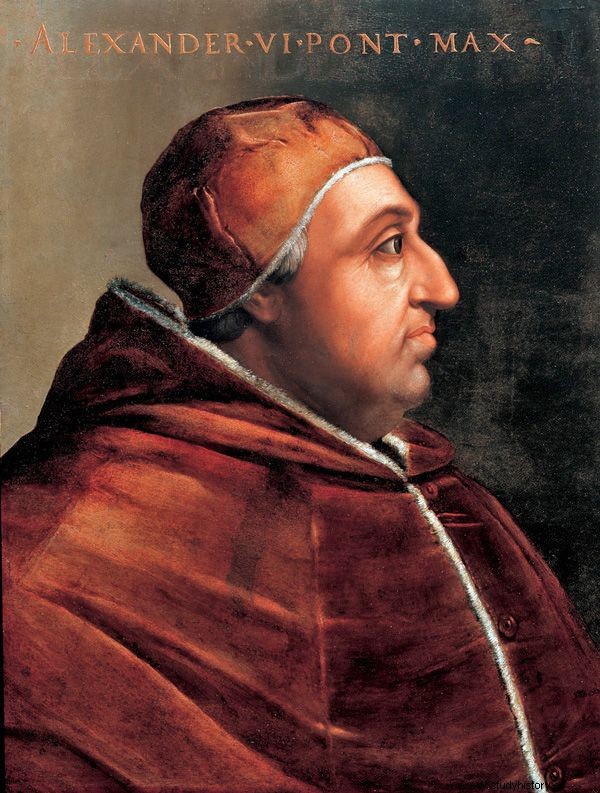
Pope Alexander VI. During his pontificate, cardinals did not die like flies (painting by Cristofano dell'Altissimo, source:public domain).
Crimes and misdemeanors, whether related in any way to her family or not, affected Lucretia's reputation. When searching for the truth, it is worth relying on the opinion of Ferdinand Gregorovius, historian and Protestant, bitter enemy of the papacy and the Borgia family.
The scholar denied all accusations against Lucrezia. In his extensive study on her life, he wrote that she had become a victim of the paid feathers of her father's enemies. She paid a heavy price for her lust for power and the tyranny of her relatives who in their ambitions did not even take into account the members of their own family.
